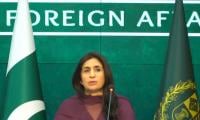MOSCOW: The Kremlin on Thursday rejected claims that Moscow was behind the poisoning of opposition leader Alexei Navalny, as calls mounted for international action after Germany said he had been dosed with Novichok.
Western leaders are demanding answers from Moscow after Berlin said on Wednesday there was “unequivocal evidence” that the 44-year-old Kremlin critic had been afflicted by the infamous nerve agent.
Navalny, one of President Vladimir Putin’s fiercest critics, fell ill on a flight last month and was treated in a Siberian hospital before being evacuated to Berlin.Germany’s claim that he was exposed to Novichok — the same substance used against Russian ex-double agent Sergei Skripal and his daughter in the English town of Salisbury two years ago — prompted widespread condemnation and demands for an investigation.
Russia denies there is any evidence that Navalny was poisoned and Kremlin spokesman Dmitry Peskov said Thursday that Berlin had not provided Moscow with proof.“There is no reason to accuse the Russian state,” Peskov said, rejecting talk of economic sanctions and urging the West not to “rush to judgement”.
Already suffering from wide-ranging Western sanctions imposed over its 2014 annexation of Crimea, as well as the effects of the coronavirus pandemic and the drop in oil prices, Moscow will be anxious to avoid any further pressure on its economy. German officials briefed the other 26 EU countries in Brussels on Navalny.
EU foreign affairs spokesman Peter Stano said a “thorough, transparent” investigation was needed to identify those responsible. “We are not there yet,” he said when asked about sanctions. Germany’s announcement sent the ruble plunging to its lowest level against the euro since 2016 and Moscow’s RTS stock exchange fell more than three percent.
“Russia’s relations with the West have once again been poisoned by Novichok,” wrote business daily Kommersant.”The main question is, how far will they decide to go?” it said. On the streets of Moscow, some expressed fears of a new hit for the Russian economy.
“I think some sanctions will be imposed and the whole situation is quite tragic. It’s quite worrisome,” said Mikhail, a financial analyst who refused to give his surname.Others dismissed the threat, pointing to government claims that sanctions had helped diversify Russia’s economy away from oil and gas.
“The government says that our economy is improving due to sanctions and we are beginning to look like a developed country rather than a gas station,” said Pavel Shkalikov, a travel agent.
A new crisis in relations with the West could also threaten Russia’s Nord Stream 2 project, a 10 billion-euro (Dh40 billion) pipeline which is set to double Russian natural gas shipments to Germany.
Former US president Donald Trump. — AFP NEW YORK: The judge overseeing former US president Donald Trump’s...
Bosnian Serb leader Milorad Dodik. — AFP FileSARAJEVO: The parliament of Bosnia´s autonomous Serb Republic adopted...
Australia's Prime Minister Anthony Albanese speaks during the opening ceremony of the 6th China International Import...
Indonesia's Ruang volcano. — AFP JAKARTA: Indonesia shut a provincial airport and evacuated hundreds of people...
Myanmar’s detained former leader and Aung San Suu Kyi. — AFP LONDON: Myanmar’s detained former leader and Aung...
President Ruto is seen with the chief of the Kenya Defence Forces General Francis Ogolla in this photo on 28 February....







